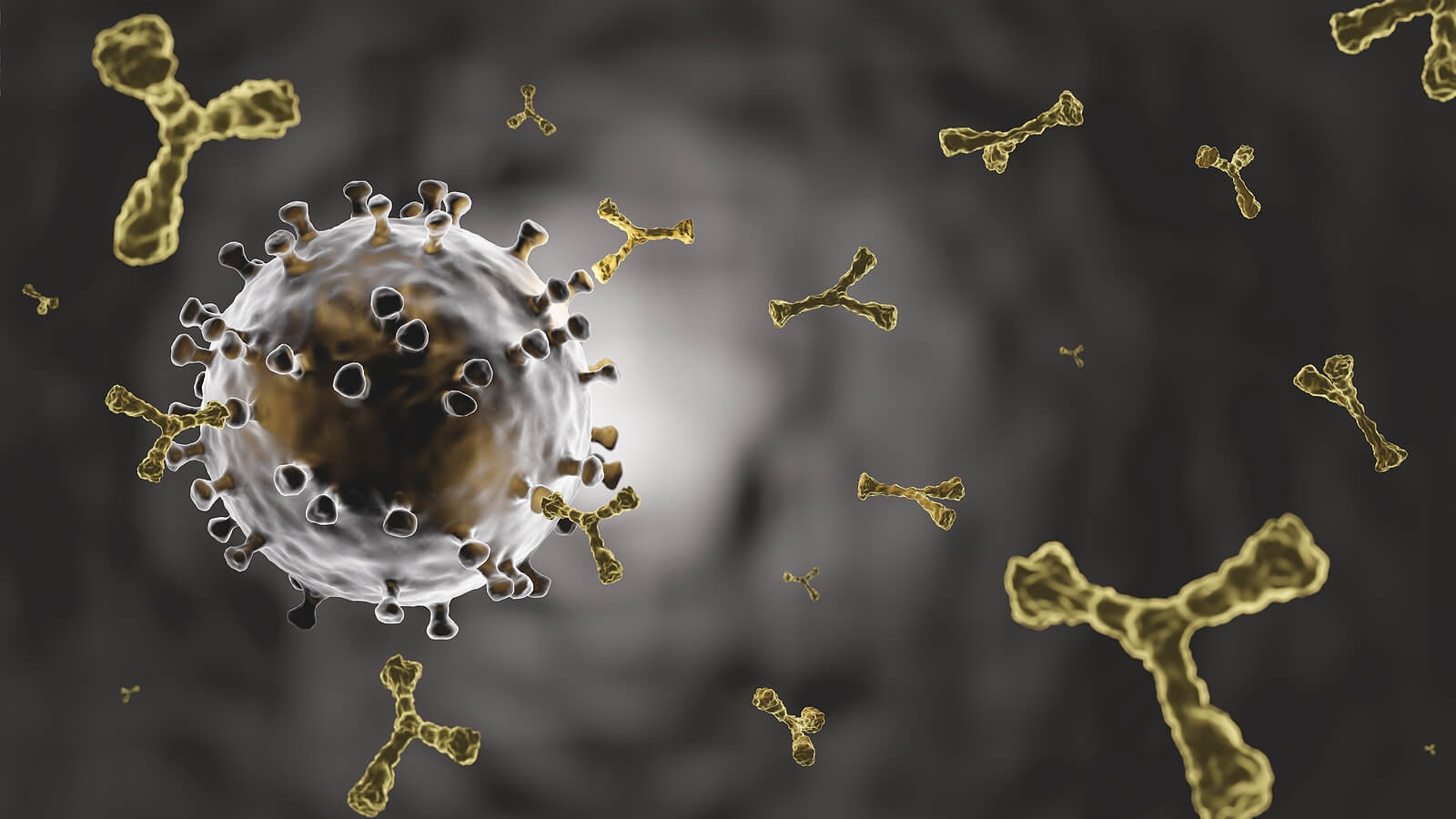What Is Thyroiditis?

The word thyroiditis has a Greek origin. It’s derived from thyreoeidḗs which means ‘thyroid’ and the suffix -itis which means ‘inflammation’. Therefore, today’s usage has come to mean a general inflammation of the thyroid gland.
The thyroid is an endocrine gland, typical of humans and other vertebrate animals. It’s shaped like a butterfly and is located in front and to the sides of the trachea, and the lower part of the larynx.
The thyroid is often referred to as the “body’s regulatory center,” as its functions influence many different aspects of overall health. These include regulation, the body’s energy expenditure, sleep, appetite, and psycho-emotional health, to a certain extent.
Among the pathologies of this gland that appear with detectable hormonal alteration is thyroiditis. But why does the thyroid become inflamed?
Types and causes

Sometimes, thyroiditis occurs as a result of an autoimmune disease that doesn’t only affect the thyroid gland, but also causes it to produce very little thyroid hormone (hypothyroidism).
This inflammation can occur temporarily in women who have just given birth, or when a person has a viral or bacterial infection and it spreads to the thyroid.
Let’s see what are types of thyroiditis exist and their respective causes.
Hashimoto’s thyroiditis
Hashimoto’s thyroiditis is one of the most common types out there. It has an autoimmune origin, which means that occurs due to the attack of antibodies against the thyroid gland, and is a cause of hypothyroidism.
Postpartum thyroiditis
Postpartum thyroiditis, as the name implies, occurs after delivery. It, too, is autoimmune in origin and can produce mixed symptoms (hyperthyroidism and hypothyroidism).
Subacute thyroiditis (De Quervain)
The cause of De Quervain’s thyroiditis is unknown, but there are sources that indicate that “it is frequently preceded by an infection of the upper respiratory tract”, and so there are those who see an infectious origin. On the other hand, scientific literature states that it can produce mixed symptoms.
Silent thyroiditis
Another type of thyroiditis that has an autoimmune origin is silent thyroiditis. Like postpartum, subacute, or De Quervain types, it can cause mixed symptoms.
Drug-induced thyroiditis
Some drugs can cause an inflammation of the thyroid when prescribed for long periods of time. This is the case with amiodarone, which is used for the prophylaxis and treatment of many heart rhythm disorders.
Radiation thyroiditis
This occurs as a consequence of the application of iodine 131. In turn, this substance is often used to treat Graves’ disease (another disorder of the thyroid gland that has an autoimmune origin). It’s one of the less common types of thyroiditis.
Infectious thyroiditis (acute and chronic)
As we mentioned before, inflammation of the thyroid can also have an infectious origin, either through viruses, bacteria, or fungi.
- Acute infectious: These are caused by Staphylococcus or Streptococcus.
- Chronic infectious: These are common in patients with a weakened immune system and has a fungal origin.
Symptoms

As the experts from the American Thyroid Association explain, “there is no single symptom that is unique to thyroiditis.” Some may be asymptomatic, others may produce symptoms. Within the latter, depending on the type of cell destruction it causes, the symptoms differ.
- If it produces hyperthyroidism, the symptoms are as follows:
- Fatigue
- Insomnia
- Anxiety
- Weight loss
- Heat intolerance
- Increased sweating
- Fast heart rate
- Frequent bowel movements.
- If it produces hypothyroidism, the symptoms are as follows :
- Fatigue
- Dry skin
- Constipation
- Cold intolerance
- Slight weight gain
- Decreased sweating
Diagnosis
Only a doctor can diagnose the type of thyroiditis. In order to do this, in addition to a physical examination and by questioning the person, they’ll order blood tests (to evaluate the hormones TSH, T3, T4, TSI, and antibodies) and some imaging tests (radioactive iodine uptake, thyroid ultrasound).
Treatment
Depending on the cause of the thyroiditis (that is, the predominant clinical condition of the patient), the treatment to be prescribed will differ.
This may include some medications (antithyroid, beta-blockers, anti-inflammatories, and others) or hormone replacement (specifically thyroid hormone). Likewise, lifestyle recommendations will depend on the cause of the problem.
If you have been diagnosed with thyroiditis, pay close attention to what the specialist tells you about your case. In this way, you won’t only be able to understand what the problem is and its scope, but also the reason for the proposed treatment and the type of self-care you should take.
Keep in mind that the specialist isn’t only the best person to treat you, but also to inform you. So, whenever you have a question, don’t hesitate to ask them.
The word thyroiditis has a Greek origin. It’s derived from thyreoeidḗs which means ‘thyroid’ and the suffix -itis which means ‘inflammation’. Therefore, today’s usage has come to mean a general inflammation of the thyroid gland.
The thyroid is an endocrine gland, typical of humans and other vertebrate animals. It’s shaped like a butterfly and is located in front and to the sides of the trachea, and the lower part of the larynx.
The thyroid is often referred to as the “body’s regulatory center,” as its functions influence many different aspects of overall health. These include regulation, the body’s energy expenditure, sleep, appetite, and psycho-emotional health, to a certain extent.
Among the pathologies of this gland that appear with detectable hormonal alteration is thyroiditis. But why does the thyroid become inflamed?
Types and causes

Sometimes, thyroiditis occurs as a result of an autoimmune disease that doesn’t only affect the thyroid gland, but also causes it to produce very little thyroid hormone (hypothyroidism).
This inflammation can occur temporarily in women who have just given birth, or when a person has a viral or bacterial infection and it spreads to the thyroid.
Let’s see what are types of thyroiditis exist and their respective causes.
Hashimoto’s thyroiditis
Hashimoto’s thyroiditis is one of the most common types out there. It has an autoimmune origin, which means that occurs due to the attack of antibodies against the thyroid gland, and is a cause of hypothyroidism.
Postpartum thyroiditis
Postpartum thyroiditis, as the name implies, occurs after delivery. It, too, is autoimmune in origin and can produce mixed symptoms (hyperthyroidism and hypothyroidism).
Subacute thyroiditis (De Quervain)
The cause of De Quervain’s thyroiditis is unknown, but there are sources that indicate that “it is frequently preceded by an infection of the upper respiratory tract”, and so there are those who see an infectious origin. On the other hand, scientific literature states that it can produce mixed symptoms.
Silent thyroiditis
Another type of thyroiditis that has an autoimmune origin is silent thyroiditis. Like postpartum, subacute, or De Quervain types, it can cause mixed symptoms.
Drug-induced thyroiditis
Some drugs can cause an inflammation of the thyroid when prescribed for long periods of time. This is the case with amiodarone, which is used for the prophylaxis and treatment of many heart rhythm disorders.
Radiation thyroiditis
This occurs as a consequence of the application of iodine 131. In turn, this substance is often used to treat Graves’ disease (another disorder of the thyroid gland that has an autoimmune origin). It’s one of the less common types of thyroiditis.
Infectious thyroiditis (acute and chronic)
As we mentioned before, inflammation of the thyroid can also have an infectious origin, either through viruses, bacteria, or fungi.
- Acute infectious: These are caused by Staphylococcus or Streptococcus.
- Chronic infectious: These are common in patients with a weakened immune system and has a fungal origin.
Symptoms

As the experts from the American Thyroid Association explain, “there is no single symptom that is unique to thyroiditis.” Some may be asymptomatic, others may produce symptoms. Within the latter, depending on the type of cell destruction it causes, the symptoms differ.
- If it produces hyperthyroidism, the symptoms are as follows:
- Fatigue
- Insomnia
- Anxiety
- Weight loss
- Heat intolerance
- Increased sweating
- Fast heart rate
- Frequent bowel movements.
- If it produces hypothyroidism, the symptoms are as follows :
- Fatigue
- Dry skin
- Constipation
- Cold intolerance
- Slight weight gain
- Decreased sweating
Diagnosis
Only a doctor can diagnose the type of thyroiditis. In order to do this, in addition to a physical examination and by questioning the person, they’ll order blood tests (to evaluate the hormones TSH, T3, T4, TSI, and antibodies) and some imaging tests (radioactive iodine uptake, thyroid ultrasound).
Treatment
Depending on the cause of the thyroiditis (that is, the predominant clinical condition of the patient), the treatment to be prescribed will differ.
This may include some medications (antithyroid, beta-blockers, anti-inflammatories, and others) or hormone replacement (specifically thyroid hormone). Likewise, lifestyle recommendations will depend on the cause of the problem.
If you have been diagnosed with thyroiditis, pay close attention to what the specialist tells you about your case. In this way, you won’t only be able to understand what the problem is and its scope, but also the reason for the proposed treatment and the type of self-care you should take.
Keep in mind that the specialist isn’t only the best person to treat you, but also to inform you. So, whenever you have a question, don’t hesitate to ask them.
- Castro Morillo Ana María, Castañeda Muñoz Ángela María, Madruga Vázquez Ketty, Hernández Fernández Diana Maité, González Rodríguez Diana, Rufín Bergado Ana Margarita. Tiroiditis granulomatosa de De Quervain. Diagnóstico por citología con aspiración por aguja fina. Rev. Med. Electrón. [Internet]. 2013 Feb [citado 2021 Jun 15] ; 35( 1 ): 52-61. Disponible en: http://scielo.sld.cu/scielo.php?script=sci_arttext&pid=S1684-18242013000100006&lng=es.
-
“Definición de Tiroiditis – Diccionario de Cáncer Del NCI – Instituto Nacional Del Cáncer.” n.d. Accessed June 15, 2021. https://www.cancer.gov/espanol/publicaciones/diccionarios/diccionario-cancer/def/tiroiditis.
-
“Función de La Glándula Tiroidea.” n.d. Accessed June 15, 2021. https://www.fairview.org/patient-education/40208.
-
Hershman, Jerome M. 2020. “Introducción a La Glándula Tiroidea – Trastornos Hormonales y Metabólicos.” Manual MSD Versión Para Público General. 2020. https://www.msdmanuals.com/es/hogar/trastornos-hormonales-y-metabólicos/trastornos-de-la-glándula-tiroidea/introducción-a-la-glándula-tiroidea.
- Paz-Ibarra José Luis. Disfunción tiroidea inducida por amiodarona en la práctica clínica. An. Fac. med. [Internet]. 2011 Ene [citado 2021 Jun 15] ; 72( 1 ): 69-78. Disponible en: http://www.scielo.org.pe/scielo.php?script=sci_arttext&pid=S1025-55832011000100012&lng=es.
- Rubalcava Lara Luis Felipe, Juárez Ramírez José Iván. Tiroiditis como consecuencia de la aplicación de yodo 131. Rev. Fac. Med. (Méx.) [revista en la Internet]. 2018 Ago [citado 2021 Jun 15] ; 61( 4 ): 30-34. Disponible en: http://www.scielo.org.mx/scielo.php?script=sci_arttext&pid=S0026-17422018000400030&lng=es.
-
“Tiroiditis | American Thyroid Association.” n.d. Accessed June 15, 2021. https://www.thyroid.org/tiroiditis/.
-
“Tiroides – Dicciomed: Diccionario Médico-Biológico, Histórico y Etimológico.” n.d. Accessed June 15, 2021. https://dicciomed.usal.es/palabra/tiroides.
Este texto se ofrece únicamente con propósitos informativos y no reemplaza la consulta con un profesional. Ante dudas, consulta a tu especialista.







